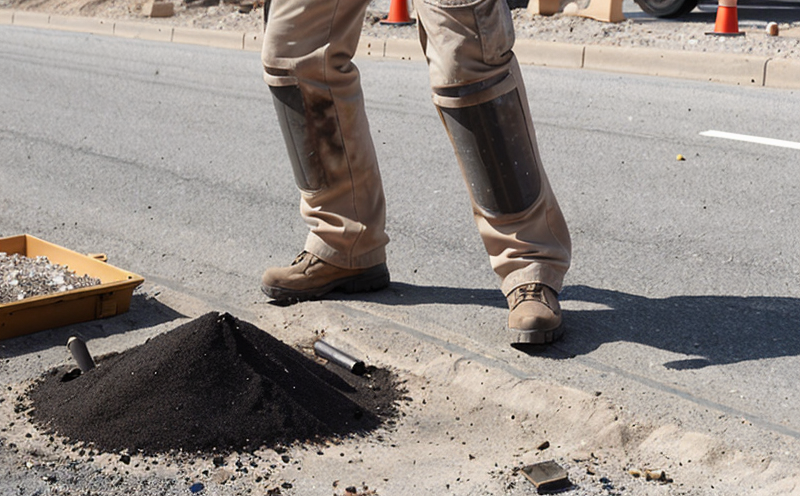BS EN 13631 Blasting Explosives General Safety Testing
The British Standard (BS) and European Norm (EN) 13631:2004 specifies the general safety testing requirements for blasting explosives. This standard is designed to ensure that blasting materials meet stringent safety criteria, thereby safeguarding workers and minimizing risks associated with explosive usage in mining operations.
The BS EN 13631 covers a comprehensive set of tests aimed at assessing various properties of blasting explosives, including detonation velocity, heat sensitivity, mechanical stability, resistance to impact, friction, and other critical parameters. Compliance with this standard is crucial for any manufacturer or supplier of blasting materials looking to ensure their products meet industry safety standards.
Testing according to BS EN 13631 involves a series of laboratory experiments designed to simulate real-world conditions under which the explosives might be used. These tests are conducted on specific specimens prepared in accordance with the standard's requirements, using precisely defined test apparatus and methodologies.
The results from these tests provide critical data that can inform process improvements, product development, and regulatory compliance efforts. For quality managers and R&D engineers, this service ensures that their products meet international safety standards, facilitating smoother supply chain management and regulatory approval processes.
Compliance with BS EN 13631 is not only a matter of meeting regulatory requirements but also an important aspect of maintaining a good reputation in the industry. By adhering to these stringent testing protocols, companies can demonstrate their commitment to worker safety and environmental stewardship.
| Test Parameters | Description |
|---|---|
| Detonation Velocity | The speed at which the explosion propagates through the material. This is a critical parameter for ensuring that explosives can be safely transported and stored. |
| Heat Sensitivity | The resistance of the explosive to ignition or detonation by heat. This test evaluates the risk of accidental ignition in high-temperature environments. |
| Mechanical Stability | The ability of the explosive to maintain its properties under mechanical stress without undergoing significant changes. This is important for handling and transport safety. |
| Resistance to Impact | The capacity of the explosive to withstand impact forces without detonating. This test assesses the risk of accidental ignition due to mechanical shocks. |
| Friction Sensitivity | The sensitivity of the explosive to frictional heat generated by rubbing against another material. This is a key factor in preventing accidental detonation during handling. |
These tests are conducted with precision and care, using state-of-the-art equipment and highly skilled personnel. The data collected from these tests forms the basis for quality control measures and can be used to refine manufacturing processes and improve product performance.
The BS EN 13631 testing process is a vital part of any company's compliance strategy in the mining sector, particularly for those involved with blasting explosives. It ensures that products meet international standards, thus enhancing safety and reliability in mining operations.
Benefits
- Enhanced Safety: Ensures compliance with industry standards to minimize risks associated with explosive use.
- Regulatory Compliance: Meets international safety regulations, facilitating smoother operations and reducing legal risks.
- Product Quality Assurance: Provides critical data for refining manufacturing processes and improving product performance.
- Market Reputation: Demonstrates commitment to worker safety and environmental responsibility, enhancing brand reputation.
Industry Applications
This service is particularly relevant for the mining sector where blasting explosives are used extensively. The tests ensure that materials meet stringent safety standards, which is crucial for operations in this high-risk environment.
| Blasting Explosives | Description |
|---|---|
| Dynamite | Used in mining to break up rock formations and create access paths. Ensures that dynamite used meets the necessary safety standards. |
| Nitroglycerine | A high-power explosive often used in deep mines where its powerful effects are needed for excavation. Ensures compliance with safety requirements. |
| Explosive Mixtures | Combination of various chemicals to achieve specific blast effects. Testing ensures these mixtures meet all necessary safety criteria. |
The results from the BS EN 13631 testing are essential for ensuring that all blasting materials used in mining operations are safe and reliable, thereby enhancing overall operational efficiency and worker safety.
Competitive Advantage and Market Impact
The BS EN 13631 Blasting Explosives General Safety Testing service provides a significant competitive advantage by ensuring that products meet the highest international standards. This compliance can lead to increased market share, as customers are more likely to trust suppliers who adhere to stringent safety protocols.
Compliance with this standard also enhances a company's reputation and establishes it as a leader in safety-conscious practices within the mining industry. This reputation can attract new clients and partnerships, opening up opportunities for growth and expansion.
In addition, meeting these standards can reduce operational risks, leading to more efficient and safer operations. This is particularly important given the high-risk nature of mining activities. By ensuring that all blasting materials meet the necessary safety criteria, companies can minimize incidents and associated costs, thereby improving profitability.





